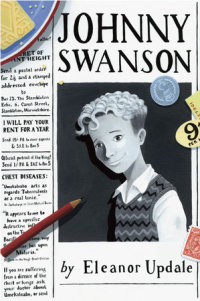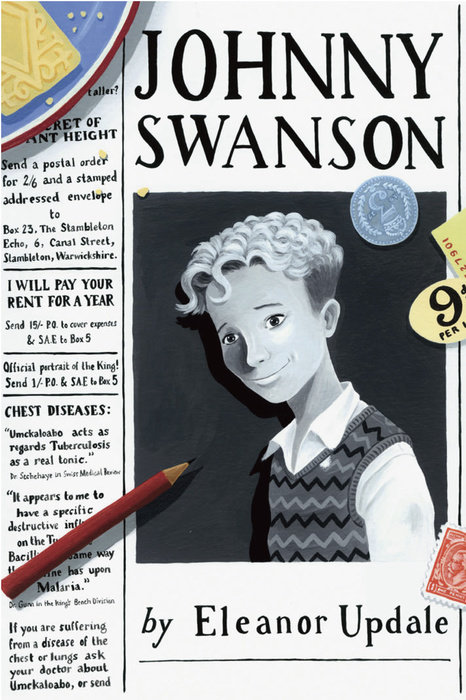Chapter 1
ATHLETICS, AUTUMN 1929
The teacher was smiling, but he wasn’t smiling at Johnny. He was looking over Johnny’s head at the other boys, lined up behind him to take their turn at the High Jump. And it wasn’t a nice smile. It couldn’t be. The scar running from Mr Murray’s eye to his chin pulled the skin of his lips to one side and gave him a permanent sneer, even when he was in a good mood. But now he really was sniggering – inviting the rest of the class to laugh at the smallest, thinnest boy as he struggled with the run-up and brought down the pole.
Johnny could feel his second-hand shorts flapping against his spindly legs. He knew he looked ridiculous, and that his only hope was to pretend that he thought it was funny too. Of course he would fail. He breathed in, clenched his fists and started his run.
Mr Murray called out to him, catching the moment to put Johnny off his stride. ‘Right then, Squirt,’ he…
Chapter 1
ATHLETICS, AUTUMN 1929
The teacher was smiling, but he wasn’t smiling at Johnny. He was looking over Johnny’s head at the other boys, lined up behind him to take their turn at the High Jump. And it wasn’t a nice smile. It couldn’t be. The scar running from Mr Murray’s eye to his chin pulled the skin of his lips to one side and gave him a permanent sneer, even when he was in a good mood. But now he really was sniggering – inviting the rest of the class to laugh at the smallest, thinnest boy as he struggled with the run-up and brought down the pole.
Johnny could feel his second-hand shorts flapping against his spindly legs. He knew he looked ridiculous, and that his only hope was to pretend that he thought it was funny too. Of course he would fail. He breathed in, clenched his fists and started his run.
Mr Murray called out to him, catching the moment to put Johnny off his stride. ‘Right then, Squirt,’ he shouted. ‘Show us what you’re made of!’
The boys gave a mock cheer. Johnny forced a smile and clattered into the bar.
After the fall he brushed the mud from his knees and swaggered to the back of the line, grinning, even though he wanted to cry. Mr Murray blew his whistle and put a stop to the laughter, swiping at Johnny’s head as he passed. ‘It’s nothing to smirk about, Swanson. This country needs men, not insects like you. You wouldn’t have got far in the war.’
The boys groaned. They were expecting another tale about Mr Murray’s bravery in France, where his face had been torn apart at the Battle of the Somme in 1916 – two years before any of them were born. But the teacher blew his whistle again and turned to the next boy in line: the muscular captain of the football team. ‘Now then, Taylor. Show Swanson how it’s done.’
Everyone cheered as Albert Taylor cleared the bar with room to spare; and at the end of the afternoon Albert was the winner and the class hero. No one wanted to know Johnny, however much he tried to turn his humiliation into a joke.
Mr Murray put Taylor in charge of clearing the hurdles from the games field and set off for the warmth of the staff room.
Taylor delegated the job straight away. ‘You need building up, Quacky,’ he said, using the nickname he knew Johnny hated. ‘The extra exercise might make you grow a bit.’ He threw Johnny the key to the shed and turned to the others. ‘Who’s coming for a game of marbles?’
The rest of the boys were happy to leave Johnny to lug the equipment away while they ran off to celebrate Albert’s triumph, and to laugh about Johnny’s shame.
Johnny had almost finished tidying the hut when he was startled by a snuffling noise outside. Had the boys come back to taunt him? Were they waiting to jump on him as he left the shed? He couldn’t make out any voices, but he thought he could hear sticks of wood bashing against each other. Maybe they were going to barricade the door so he couldn’t get out. They all knew he’d just started a job after school. They’d love to get him into trouble by making him late for his paper round. He pushed hard at the door, hoping to knock away whatever barrier they had already built.
The door swung open easily. There was no one there – just a big wooden hoop rolling away across the field. Then he heard a whimper and looked round. A girl was lying on her back on the grass behind the door. She had half a dozen hoops around her neck, and more looped over each outstretched arm. Like a beetle flipped upside-down, she was wriggling but couldn’t get up.
‘You knocked me over,’ she sniffled.
‘I’m sorry,’ said Johnny. ‘I didn’t know you were there.’ Although the girl was wearing glasses, he could see that she was crying, and had been weeping even before the door hit her. He lifted the hoops off her and helped her to her feet.
‘They made me carry everything,’ she said, brushing the earth off her gymslip. ‘It’s just because I’m new.’ Her voice had an unfamiliar sing-song lilt.
‘I thought I hadn’t seen you before,’ said Johnny.
‘I only started here on Monday. I’m in Mrs Palmer’s class. They all hate me already. It’s because of my accent.’
‘Accent?’ said Johnny, pretending he hadn’t noticed it.
‘I’m Welsh,’ said the girl. ‘And I’ve got a Welsh name: Olwen. For some reason, all the other girls seem to think that’s funny. And they call me “The Owl” because of my glasses. My specs kept falling off when we were exercising with the hoops. They all laughed at me.’
‘Everyone gets picked on for something,’ said Johnny, acutely aware that Olwen was taller than him, even though she was in the year below. ‘They get at me for being so small. That’s how I ended up having to put away all our gear. I’ll help you stack those hoops in the shed. My name’s Johnny, by the way. Johnny Swanson.’
As Olwen passed him the hoops, she told him about her new home. ‘We had to move here from Wales,’ she said. ‘My dad lost his job in Swansea, and we had no money at all. So he wrote to an old army friend from the war to see if he could help us out. Lucky for us, he said yes. I don’t know what would have happened to us without him. Anyway, now we’re living at Newgate Farm.’
‘Where’s that?’
‘It’s just outside town. Dad’s supposed to be working there, but he and Mum are both ill. They were sick even before we moved, and the journey just seems to have done them in.’
‘Have you got any brothers and sisters? Are they at this school too? If you’ve got a brother he should defend you against those horrible girls.’
‘Just a sister. She’s a baby. She’s too young for school. And she’s ill too, now. Mum was worried about her this morning. It’s her breathing, see. Maybe the country air doesn’t agree with her. I really should go home and see if she’s any better. It’s a long walk.’
Johnny remembered his job at the shop. ‘I must be getting along too,’ he said.
They ran to the school gate together. ‘Don’t worry about those other girls,’ said Johnny as they split up. ‘They’ll soon get used to you. But if you have any more trouble with them, just come and see me.’ He wasn’t really sure what he was offering to do on her behalf, but Olwen seemed pleased to have found a friend at last.

